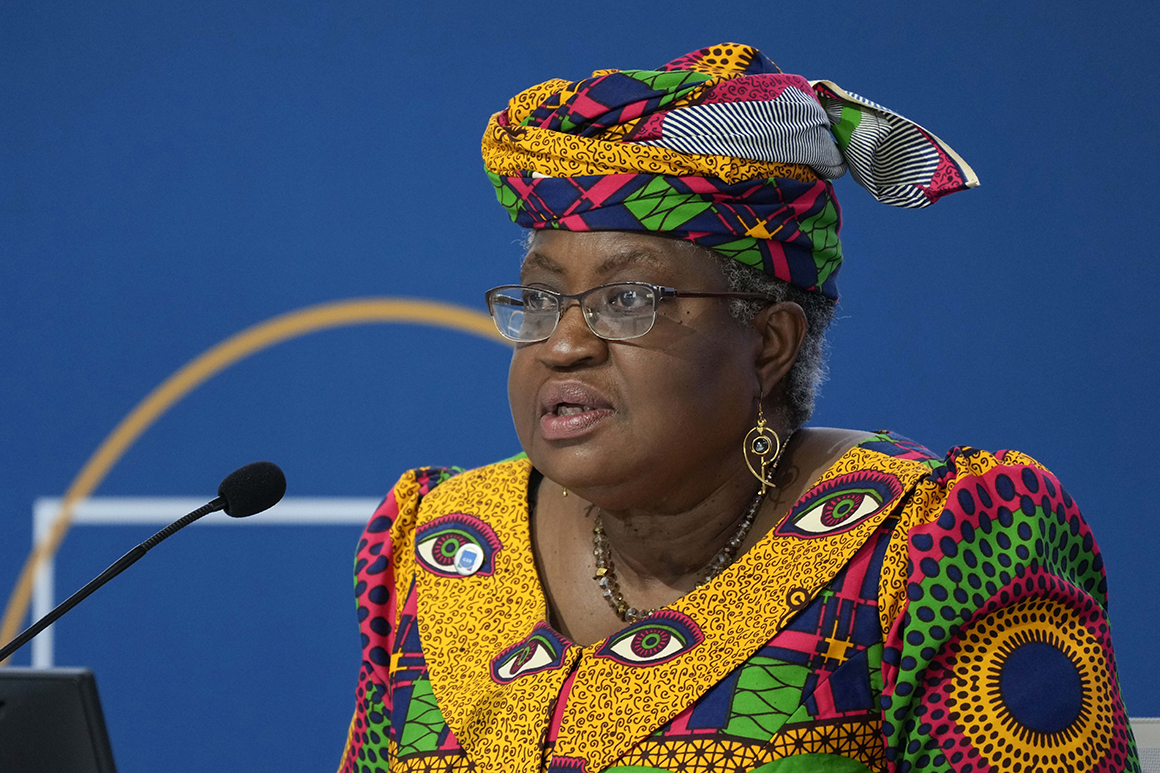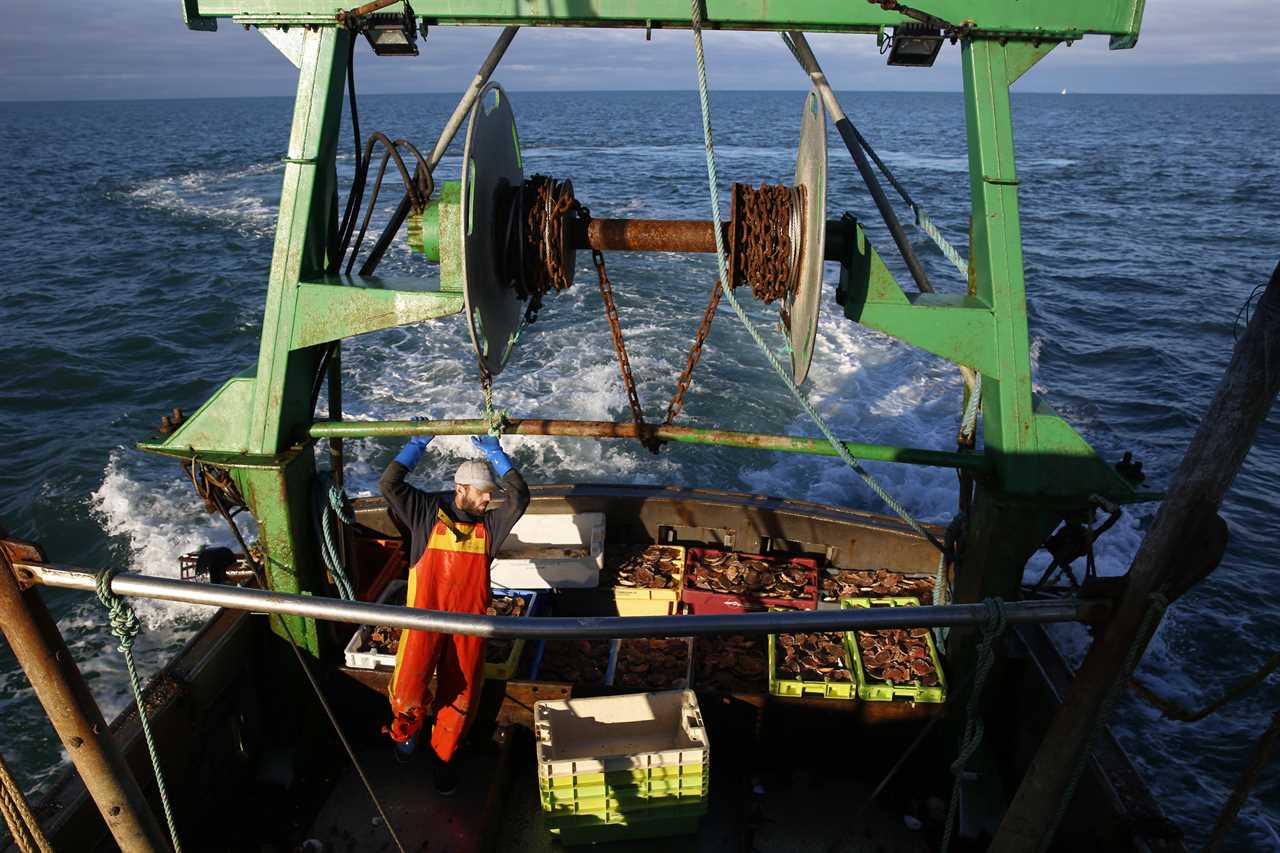
The future of world trade is about to face a turning point: whether nationalist policies displace an eight-decade shift toward rules-based global commerce.
This week’s biennial World Trade Organization conference in the United Arab Emirates will see its 164 member countries try to reach deals on the fate of the world’s fish stocks, the future of digital trade and how countries can safeguard their food security.
But agreement on any of those issues may not be enough to salvage a global institution that is increasingly torn apart by the conflicting goals of its members, economic fragmentation fueled by Russia’s war in Ukraine and retreating American leadership on global trade.
“You could put the world's greatest matchmaker, arbiter and negotiator in charge of the WTO right now and I don't think much could happen,” said Rufus Yerxa, a former U.S. trade official who was a WTO deputy director from 2005 to 2013.
The failure of WTO member countries to produce anything meaningful at the group’s 13th Ministerial Conference could further erode the Geneva-based organization's ability to create new global trade rules and prevent a world in which competing economic blocs cause higher prices for consumers and businesses.

"There are so many things that could go badly at the ministerial for global trade and economic growth, and the question is whether enough WTO members can do damage control and curb some of their protectionist and populist leanings," said Christine McDaniel, a former Treasury, White House, Commerce Department and USTR economist now at the Mercatus Center, a free market think tank.
The United States, one of the main architects of the WTO system last century, increasingly questions the organization’s underlying structure. Two decades after shepherding China into the WTO, U.S. leaders of both parties accuse the organization of doing little to bring Beijing’s economic system in line with fair and open global trade.
“For decades, the United States has been proud to champion the international rules-based order and the multilateral trading system,” said U.S. Trade Representative Katherine Tai last fall in a speech at the Center for Strategic and International Studies. “But the functioning and fairness of this order are now in question.”
In an annual report released Friday on China's WTO compliance, Tai said that "China still embraces a state-directed, non-market approach to the economy and trade" despite being a WTO member for 22 years.
Former President Donald Trump, who repeatedly busted WTO norms during his term in office, is now threatening to impose an additional 10 percent tariff on all other countries if he retakes the White House, a move that would violate WTO rules and likely spark retaliation. He’s also pledged to revoke “permanent normal trade relations” with China, setting the stage for additional tariffs on top of those he imposed on more than $300 billion worth of Chinese goods in 2018 and 2019.
Trump’s tough trade talk makes it hard for the Biden administration to reach any agreements that could make it appear weak in the eyes of blue-collar voters who feel burned by previous U.S. trade deals. That also overhangs this week’s ministerial.
“Why would people make a deal with us now on key WTO issues if they don't even know whether the next administration will accept the deals?” Yerxa said.
Despite the contentious backdrop, WTO Director General Ngozi Okonjo-Iweala bristles at the suggestion that the WTO is dead in the water. “I’m not the kind to work for a paralyzed or moribund organization. I have too much to do to waste my time on that,” she said in the run-up to the meeting. “If it's moribund and paralyzed, I'm out. Simple.”
Here’s a roundup of the issues at stake at the upcoming ministerial:
Fishing subsidies: The WTO reached a partial agreement at its last ministerial conference in June 2022 to curb subsidies that threaten the future of ocean fish supplies.
This time they are trying for a more comprehensive agreement that would hopefully have a much bigger impact on maintaining one of the world’s most important food stocks.
Of all the issues at stake in Abu Dhabi, officials are most hopeful about getting this negotiation over the line. “If there’s no agreement on fish at MC13, that’d be a tragedy,” one Geneva-based diplomat said.

For Okonjo-Iweala, the negotiation is proof the WTO is still relevant. “260 million people depend on fisheries for their livelihood, and the oceans are being overfished. [The question for ministers in Abu Dhabi is] can we save the oceans, be part of the regenerative blue economy and save jobs?” she told POLITICO in an interview.
Digital trade: One of the biggest achievements of the upcoming ministerial meeting could be maintaining a ban on the collection of tariffs on digital goods and other “electronic transmissions.”
The ban has been in place since 1998, but some member countries such as India, South Africa and Indonesia believe they are missing out on valuable tariff revenue because of streaming services that have largely replaced DVDs and CDs.
Supporters of the ban say the lost revenue is trivial compared to the cost of letting the moratorium expire, which they worry could open the door for tariffs on all sorts of data and transactions that cross borders over the internet.
Business groups also argue failure to renew the moratorium would be a major setback since it would be the first time the WTO has made a decision that makes it harder to trade.
“The majority of members want the extension but there are a few members who find it's a problem because they think it has an impact on revenues,” Okonjo-Iweala said. “Let's see what comes up from the negotiations. We were able to successfully extend the e-commerce moratorium” at the WTO’s 12 Ministerial Conference in June 2022.
Dispute settlement: The United States’ most meaningful move at the WTO in recent years was a negative one in 2019, when the Trump administration effectively killed the group’s powerful Appellate Body, which decided trade disputes between member countries, by blocking the appointment of new judges.
Trump officials charged the panel had gone too far in restricting how the United States could impose duties on goods it believes are unfairly priced or subsidized. Trump’s chief trade negotiator, Robert Lighthizer, called it “a colossal and tragic failure” in a recent book.
But most other members want to see the Appellate Body restored so they can appeal lower panel decisions that they believe are mistaken.
Some progress could be made in Abu Dhabi, but Biden administration officials have been clear they see the end of 2024 — after the U.S. presidential election — as the real deadline for reaching an agreement to reinstate some sort of judicial function.
Food security: In what has become a regular feature of recent WTO ministerials, India wants its anti-hunger program to be permanently protected against a challenge that it violates the country’s cap on trade-distorting farm subsidies.
It won a temporary peace agreement in 2013, but major agricultural exporters, including the United States, are increasingly frustrated by the way India operates its food security program, particularly for heavily-traded commodities such as rice and wheat.

India has threatened to block progress on all other issues at the upcoming ministerial unless an agreement on its public stockholding is reached. That puts tremendous pressure to accommodate India’s demand or risk having a failed ministerial.
Covid-19 treatment patent waivers: WTO members could also face a decision on whether to waive intellectual property protections for Covid-19 therapeutics and diagnostics. That would open the door for developing country manufacturers to make generic versions of Paxlovid and other treatments, as well as test kits and assorted other products.
But with Covid-19 feeling like a problem of the past for some, expectations of a deal are very low.
South Africa, India and other developing countries have pushed for the decision after winning a waiver for Covid-19 vaccines at MC13. The Biden administration has avoided taking a public position on the issue, which is fiercely opposed by the U.S. pharmaceutical industry and the business community more broadly, but supported by groups on the left.
The WTO committee in charge of discussing intellectual property rights recently told the WTO General Council that it had been unable to reach agreement on the issue after more than 18 months of discussion. That could signal the end of the road for efforts to expand the waiver, but pharmaceutical industry officials fear it could still be approved by ministers at MC13 as part of the final horse-trading that occurs to reach some deal.
WTO accessions: One bright spot on the meeting’s agenda is the accession of two new members, Comoros and Timor-Leste, to the WTO. They will be the first new members since Liberia and Afghanistan joined in July 2016.
The combined population of the two countries is less than 2.5 million, so the accessions won’t mean much to world trade. Timor-Leste is the larger of the two, with an estimated population of about 1.3 million in 2021, while Comoros has less than 900,000 people.
Another 22 countries are currently negotiating the WTO, another statistic Okonjo-Iweala cites to refute talk that the group is becoming irrelevant. The number of applicants “speaks for itself in terms of the organization and the way that people and countries see it,” she said.
----------------------------------------
By: Doug Palmer and Camille Gijs
Title: WTO in ‘damage control’ mode as Abu Dhabi agenda unravels
Sourced From: www.politico.com/news/2024/02/25/world-trade-cooperation-will-be-put-to-the-test-in-abu-dhabi-00143019
Published Date: Sun, 25 Feb 2024 22:00:00 EST






